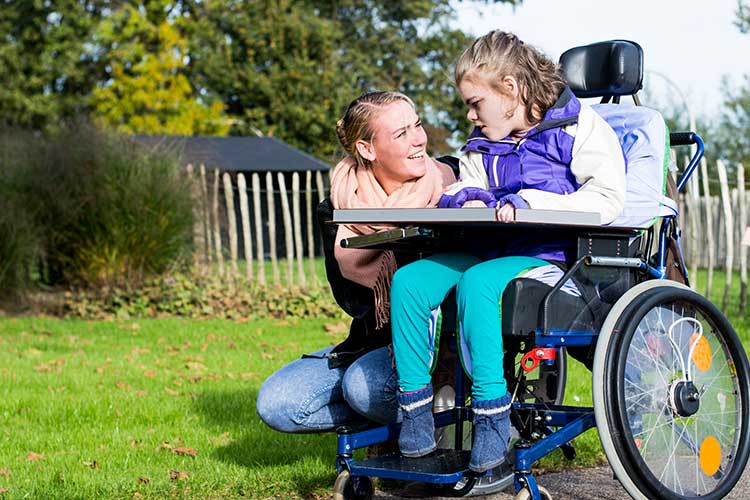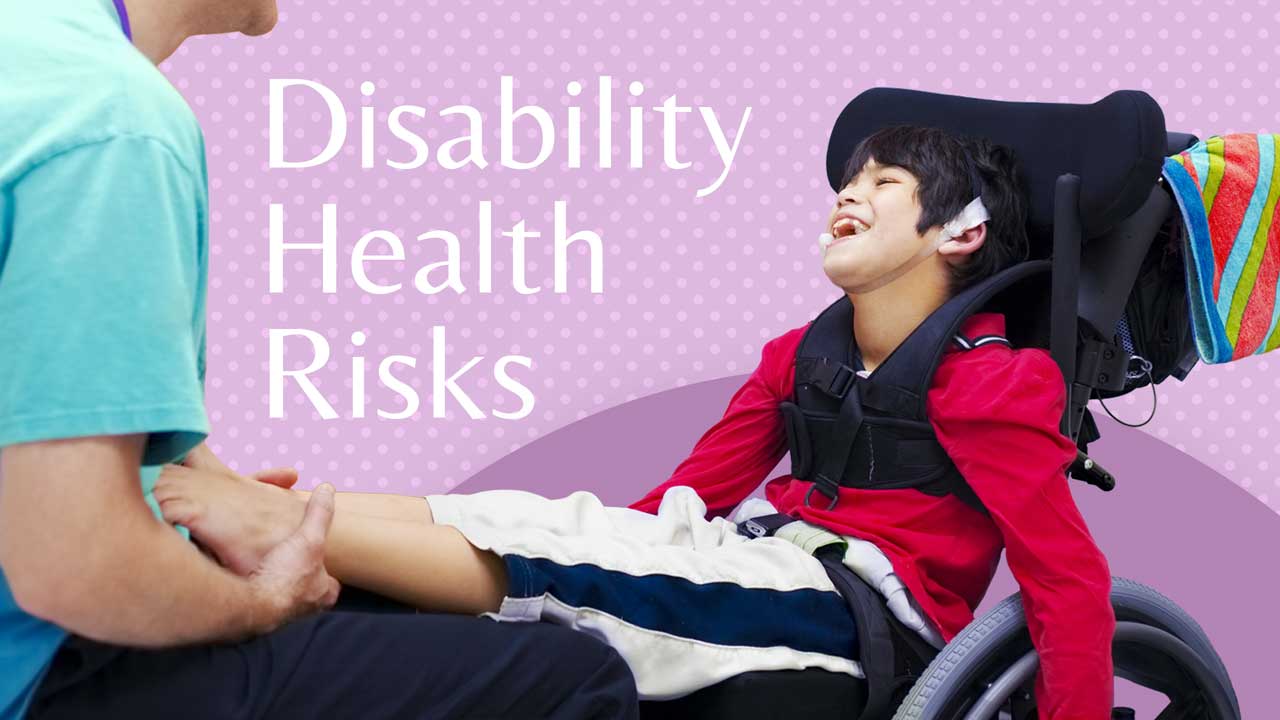All NDIS participants have the right to be in optimal physical, oral and mental health. It’s therefore the responsibility of providers to monitor participants’ health, safety and wellbeing, help them to maintain their health and assist in accessing healthcare services (ACSQHC & NDIS Commission 2021).

Causes of Death in People With Disability
Between July 2013 and June 2018, the leading causes of death in people with disability were:
- Perinatal and congenital conditions
- Spinal muscular atrophy
- Coronary heart disease
- Suicide
- Cerebral palsy.
(AIHW 2020)
Those at the highest risk of potentially avoidable death were people with acquired brain injury, vision impairment (as their primary disability) and psychosocial disability (AIHW 2020).
Underlying Causes of Death in People With Disability
A 2019 study found that the most common underlying cause of death in people with disability (predominantly those with intellectual disability) was respiratory disease, accounting for 19% of cases. Most commonly (in just under half of all cases), this involved aspiration pneumonia (Salomon & Trollor 2019). Other common underlying causes included:
- Nervous system diseases (14%) - most commonly caused by epilepsy
- Circulatory diseases (13%) - most commonly caused by ischaemic heart disease
- Neoplasms (13%) - most commonly caused by malignant neoplasms of the digestive organs, trachea, bronchus and lungs.
(Salomon & Trollor 2019)
The most common unnatural or external cause of death was accidental choking (Salomon & Trollor 2019).
Why Are People Living With Disability at Increased Risk of Preventable Death?
- They may have difficulty communicating when they feel unwell or are in pain, or their methods of communication may be poorly understood by others
- Their symptoms or behaviours may be attributed to their disability instead of the true cause, preventing them from receiving proper assessment and treatment
- They may be experiencing individual, medical, communication or social problems such as poor nutrition, inappropriate accommodation, abuse, neglect or homelessness
- They may not be receiving appropriate preventative care or treatment
- They may have lifestyle factors that increase the risk of death, such as obesity, lack of physical activity, isolation, smoking and excessive alcohol intake
- They often have risk factors for respiratory disease, including polypharmacy, psychotropic prescriptions, impaired swallowing function, sedation and hypersalivation.
(ACSQHC & NDIS Commission 2021; Salomon & Trollor 2019)
Health Risks in People With Disability

Factors that may increase the risk of mortality in people with disability include:
- Mental illness, including depression, anxiety and self-harming behaviours
- Comorbidities such as epilepsy
- Issues related to eating and drinking, including dental issues, gastro-oesophageal reflux disease (GORD), medicine side effects and disease symptoms
- A need for communication and/or mobility support
- Polypharmacy, including psychotropic medicines being prescribed with no diagnosed mental illness
- Not receiving recommended vaccinations, particularly influenza and pneumococcal disease
- Lack of routine comprehensive health assessments
- Being outside a healthy weight range.
(Salomon & Trollor 2019)
How Can These Health Risks be Addressed?
Identifying Changes in Health
It’s important to have adequate knowledge of the participant’s normal state of health so that any changes or new symptoms can be identified as soon as possible. This will ensure the participant receives appropriate care in a timely manner and may prevent any illnesses from worsening (ACSQHC & NDIS Commission 2021).
Changes that may indicate illness include:
- Unplanned weight loss or gain
- Sudden changes in eating habits
- Sudden breathlessness or change in respiratory status
- Reduced activity due to fatigue
- Facial expressions that indicate pain or discomfort
- Sudden behavioural changes.
(ACSQHC & NDIS Commission 2021)
It’s important to develop trust with the participant so that they feel comfortable communicating that they are unwell. This also requires understanding the way in which the participant communicates (ACSQHC & NDIS Commission 2021).
Once changes in health have been identified, care should be escalated as soon as possible (ACSQHC & NDIS Commission 2021).
Undertaking Annual Comprehensive Health Assessments
Regular comprehensive health assessments have a variety of benefits for people living with disability, including:
- Identifying health risks that could lead to illness or death
- Maintaining health and wellbeing
- Ensuring any unmet health needs are addressed
- Preventing illness
- Ensuring the participant receives regular healthcare.
(ACSQHC & NDIS Commission 2021)

A comprehensive health assessment should involve a discussion and review with a general practitioner, where the following is addressed:
- The person’s medical history
- A mealtime, nutrition and swallowing assessment
- Current health issues
- Current medicines
- Lifestyle risks.
(ACSQHC & NDIS Commission 2021)
Based upon this assessment, as well as a physical examination, the GP may recommend preventative care such as regular screening for conditions like cancer (ACSQHC & NDIS Commission 2021).
A healthcare plan comprising any recommendations made by the GP should then be developed in collaboration with the participant and the provider (ACSQHC & NDIS Commission 2021).
Proactively Managing Chronic Illness
Chronic illnesses should be continuously managed in order to prevent the worsening of symptoms. This should include:
- Monitoring symptoms
- Making lifestyle changes if indicated
- Attending regular appointments
- Reviewing medications
- Health education for carers, such as correct use of asthma inhalers.
(ACSQHC & NDIS Commission 2021; Chang et al. 2017)
Supporting People With Disability to Address Health Risks
NDIS participants should be supported to maintain their health, access healthcare and undertake regular health assessments. This can be achieved through:
- Developing a healthcare plan
- Enabling informed decision-making (using family members, support workers or guardians if required)
- Providing accessible healthcare information
- Encouraging the participant to communicate with healthcare providers when they are unwell, which may require establishing a communication system using words, signs or symbols they can use to describe what they are feeling (e.g. pain, nausea, fever, anxiety)
- Helping the participant make and attend medical appointments if required
- Arranging transport, telehealth or parking for appointments, if required
- Considering the participant’s triggers for distress, communication aids and physical access requirements when planning appointments
- Supporting the participant to keep in touch with their general practitioner
- Supporting the participant to communicate with healthcare providers in their preferred way
- Noting any symptoms to watch out for
- Supporting participants with chronic illness to understand their condition, treatment and lifestyle requirements, and encouraging them to regularly see their GP
- Supporting the participant to access regular medical and dental check-ups
- Ensuring all support staff have access to important health information, including:
- Current health issues
- Medications (and any adverse effects from medications)
- Allergies
- Reports from medical specialists and allied health professionals
- Documenting all visits to healthcare providers in the participant’s file, along with any recommendations that were made
- Regularly reviewing the participant’s medical and health records, and performing an annual comprehensive review to identify any risks, concerns or potentially undiagnosed issues.
(ACSQHC & NDIS Commission 2021)
Test Your Knowledge
Question 1 of 3
What is the most common underlying cause of death in people with disability?
Topics
References
- Australian Commission on Safety and Quality in Health Care & NDIS Commission 2021, Practice Alert: Comprehensive Health Assessment, Australian Government, viewed 2 May 2025, https://www.ndiscommission.gov.au/sites/default/files/2022-05/practice-alert-comprehensive-health-assessment.pdf
- Australian Institute of Health and Welfare 2020, Mortality Patterns Among People Using Disability Support Services: 1 July 2013 to June 2018, Australian Government, viewed 2 May 2025, https://www.aihw.gov.au/reports/disability-services/mortality-patterns-of-people-using-disability-serv/summary
- Chang, C, Chen, C, Broadbent, M, Stewart, R & O’Hara, J 2017, ‘Hospital Admissions For Respiratory System Diseases in Adults With Intellectual Disabilities in Southeast London: A Register-Based Cohort Study’, BMJ Open, vol. 7, no. 3, viewed 2 May 2025, https://bmjopen.bmj.com/content/7/3/e014846
- Salomon, C & Trollor, J 2019, A Scoping Review of Causes and Contributors to Deaths of People With Disability in Australia: Summary of Key Findings, Department of Developmental Disability Neuropsychiatry University of New South Wales, viewed 2 May 2025, https://www.ndiscommission.gov.au/sites/default/files/2024-09/summary-findings-24.pdf
 New
New 
